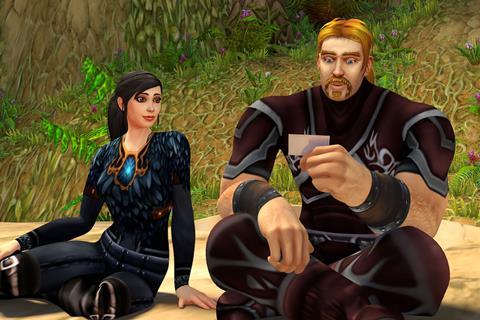Norwegian documentary uncovers the full extent of a hardcore gamer’s online life after his untimely death

Dir: Benjamin Ree. Norway. 2024. 104mins
When Norwegian gamer Mats Steen lost his battle against a degenerative muscular disease at the age of 25, his parents and family mourned not just the loss of his life, but also the opportunities for friendship, love, adventure and human connection that the disease had stolen from him. Then messages from strangers around the world started to flood in, and the family came to understand that Mats’ online existence had been richly rewarding.
Makes a case that emotional connections are no less valid when they are forged outside of the physical world
The third feature documentary from Benjamin Ree (Magnus, The Painter And The Thief), Ibelin recreates Mats’ virtual life as a role-playing participant in World of Warcraft, making a case that emotional connections are no less valid when they are forged outside of the physical world. This is not, however, a film that takes a balanced look at the impact of extensive long-term gaming; there is little sense of the stunting of psychological interactions or of the potential for online toxicity. It’s a (virtual) life-affirming approach that is certainly affecting, but can feel a little disingenuous. As such, the film is unlikely to enjoy the widespread impact of Ree’s previous picture, The Painter And The Thief, which won a Special Jury Award at Sundance 2020. It could, however, find a warm reception among digitally attuned younger audiences.
There is a stigma attached to people with such an all-consuming gaming addiction as Mats. It assumes that people who choose to spend their lives hiding behind a muscle-bound avatar, battling with dragons, do so because they are unable to function in the real world. Ree’s film acknowledges this assumption but counters with the argument that, for gamers like Mats and many of the members of his online community, the virtual world offers them a means of connection that would simply not be possible otherwise. A mother and her autistic teenage son, for example, find a way – at Mats’ suggestion – to hug virtually, something that the boy’s sensory issues made impossible in the physical world.
Ree’s approach divides the film into two distinct sections. The first, using interviews with Mats’ parents and drawing from an extensive collection of home video footage, looks at Mats’ life, and the inexorable progression of his disease; a severe form of muscular dystrophy known as Duchenne. His parents talk of a sense of helplessness as their teenage, wheelchair-dependent son pulled away from opportunities and activities, preferring to spend his time gaming in his self-contained basement apartment.
The second part of the film, which combines excerpts from Mats’ blog, interviews with fellow gamers and detailed animated recreations of Mats’ online existence (lived through his imposing, strong-yet-sensitive alter-ego Ibelin) explains the attraction of the virtual world. The boy who missed out on teenage rights of passage such as partying, flirtation and first love strikes up numerous connections with the chesty fantasy women of World Of Warcraft.
But behind these pneumatic digital avatars are real girls, nurturing real feelings for Ibelin/Mats. An archive of some 42,000 pages of gaming dialogue (collected and stored by the ‘Guild’, or community, of which Mats was a member) provides the building blocks from which Mats’ gaming life is recreated, and it reveals a personable, caring young man who takes an interest in his fellow players. It also reveals a fair amount of fatuous bickering and small talk – so perhaps the online world and the real one are not so different after all.
Production company: Medieoperatørene
International sales: Autlook Filmsales welcome@autlookfilms.com
Producer: Ingvil Giske
Cinematography: Rasmus Tukia, Tore Vollan
Editing: Robert Stengård
Head animators: Rasmus Tukia, Ada Wikdahl
Music: Uno Helmersson
























